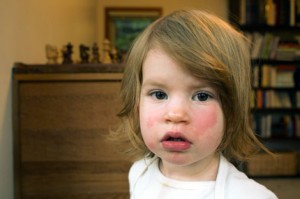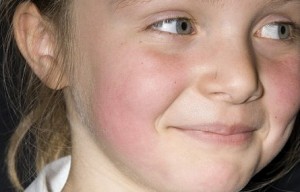Slapped cheek syndrome is the fifth most common disease in children. Though it is said to be a childhood disease it can possibly affected individuals of all ages. Similar to other infections even slapped cheek syndrome shows some related signs and symptoms. One of the most common symptoms of slapped cheek syndrome is prominent red rashes that can be seen on both the cheeks; perhaps this is the reason why the condition is named as Slapped Cheek Syndrome. This childhood condition may cause due to infectious virus called parvovirus B19. Slapped cheek syndrome may also be referred to as fifth disease or erythema infectiosum.
Frequency of Slapped Cheek syndrome reports:
It is believed that slapped cheek syndrome is one of the most common childhood infections. Most people do not learn that they are affected by parvovirus B19 virus. This is perhaps because the symptoms experienced during the affliction of the disease are usually mild or in some cases the infection is nondescript. It is said that approximately 50% to 80% of adult individuals have been infected by this virus. Widely accepted belief is that once an individual is infected by a virus, he or she may develop lifetime immunity against the virus. Slapped cheek syndrome is frequently diagnosed in children between the age group of 3 to 15 years. Records indicate that most cases related to the condition are reported during winter and early spring. Irrespective of the gender, whether male or female the conditions can affect anyone.
Is slapped cheek syndrome contagious?
Parvovirus B19 is categorized as an airborne virus; these are viruses that can survive in the air for a short period of time. Hence, parvovirus can said to be a contagious virus that spread through the air, in the same way the convention viruses are transmitted. Similar to cold and flu virus even Parvovirus B19 can infect another person through sneeze, coughing etc. While you sneeze or cough miniscule droplets of contaminated saliva carrying infection are released in the air which are possibly inhaled by someone else who may get infected by the virus.
Who are prone to slapped cheek syndrome?
As mentioned above children are more susceptible to slapped cheek syndrome than other individuals. However, the infection found in children is benign and self limiting, which means that the condition may ebb away through the time without any need of treatment. Nevertheless, there are groups of individuals who may be more prone to slapped cheek syndrome and the virus can cause serious symptoms in them. Here are few of such groups.
Individuals with certain blood issues:
Individuals who suffer from blood issues such as sickle cell anemia, wherein blood faces deficiency of good red blood cells, may be more prone to slapped cheek syndrome. The parvovirus B19 viral infection may get worsen and even more healthy blood cells may be lost.
Pregnant ladies:
In case of pregnant women without immunity to parvovirus B29 may augment the chances of miscarriage as the virus can lead to serious anemia in the unborn infant.
People with weak immune system:
People with weak immunity are prone to slapped cheek syndrome or parvovirus B19 infection. Weak immunity or immunocompromised condition may develop due to several factors such as side effects of medications and affliction of severe diseases such as HIV. These groups when afflicted with slapped cheek syndrome may experience persisting symptoms of the infection.
Slapped cheek syndrome symptoms:
Symptoms of slapped cheek usually develop from 13 to 18 days after the affliction of parvovirus B19 infection. There are three different stages of slapped cheek syndrome and every stage has certain symptoms.
1.) First stage of slapped cheek syndrome may include mild symptoms such as:
• High fever of approximately 110.4F
• Sore throat
• Head pain
• Stomach upset
• Tiredness
• Itchiness of skin
Symptoms in adults:
• Joint pain
• Hand pain
• Knee pain
• Wrist pain
• Ankle pain
It should be understood that slapped cheek syndrome is most contagious during its first stage.
2.) Second Stage Slapped cheek syndrome:
Second stage slapped cheek syndrome symptoms may develop from 3 to 7 days after the infection of parvovirus B19. The second stage symptoms usually include some of the first stage symptoms as well as prominent red rashes seen on both side of cheeks.
3.) Third stage slapped cheek syndrome:
Third stage slapped cheek syndrome usually starts from 1 to 4 days after the red prominent rashes are noticed on the skin. The condition if left untreated during the second stage may progress to third stage and cause the red prominent rashes to spread from cheeks to chest, abdomen, arms, etc. these rashes may irritate the child as these lace like rashes are itchy causing discomfort. During the third stage of slapped cheek syndrome the infection does not remain contagious.
Slapped cheek syndrome- treatment:
Slapped cheek syndrome does not have any specific medication that is devised specially for treating slapped cheek syndrome. Since, the condition is benign cures at its own there are no specific medication devised for the condition.
• In case of inflammatory and painful conditions one case use medications such as painkillers, like paracetamol, ibuprofen, etc. This treatment should be also after consulting a doctor. For children below 16 years, aspirin is not suggested.
• Antihistamine may also be used by affected individuals in order to obtain alleviation from the symptoms. It should be remembered that not all antihistamine are suitable for children.
• Moisturizing lotions are another way to gain relief from other symptoms such as inflammation and itchiness etc.
• It is essential to drink plenty of fluids and take sufficient rest under prevalence of the condition. This will help in obtaining relief from symptoms high body temperature and sore throat.
Irrespective of the term of affliction, it is essential for any person experiencing such symptoms should be diagnosed immediately. This will help in determining the actually cause of the symptom. If the person is suffering from slapped cheek syndrome then immediate medical attention can be obtained.

